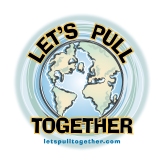Our website has been moved and updated. Please visit www.letspulltogether.org for online registration.
Native plants are species that occur naturally in a particular region and are adapted to climate and elevation of a particular area. Native plants are appealing to humans and wildlife and are friendly to their environment.
Why are noxious weeds a problem?
- The problem of noxious, non-native weeds proliferating in Central Oregon is severe.
- Many noxious weeds overrun native vegetation, reducing habitat for other plants and wildlife, destroy ecosystems by altering soil, hydrology, steal scarce water, and increase fire danger.
- Noxious weeds infest crops and cost local communities in terms of visual blight, a reduction of property values and lost agricultural production.
- Some noxious weeds are poisonous to humans, livestock, and wildlife.
- Seeds from noxious weeds are spread by foot and vehicular traffic along our roadways and through our public lands.
- Many property owners unknowingly have these non-native, noxious weeds growing in their yards and fields, which aggravates the situation.
- Sometimes this damage cannot be undone except by sustained effort over decades.
- Knapweed
- Dalmatian Toadflax
- Orange Hawkweed
Need help identifying noxious weeds?
Please visit any our noxious weed displays for complimentary noxious weed id material.
- Deschutes County, 1300 NW Wall Street
- Deschutes County Road Department, 61150 SE 27th St
- City of Bend, City Hall, 710 NW Wall Street
Additional Help:
- Site Visits are available for property owners
- Educational Presentations can be made to your group or neighborhood
- The Deschutes County Weed Wagon boasts a ton of helpful information, id material, education videos and is available for larger events
- The Deschutes County Weed Advisory Board meets monthly and welcomes your participation and involvement.
- Oregon State weed laws provide governing agencies the authority for enforcement and compliance. In Deschutes County, fines for failure to control noxious weeds can reach up to $2000 per day, in Bend fines can reach up to $750 per day.
- Deschutes County offers technical advice and may have financial assistance for landowners with noxious weeds. For more information:
Contact Information:
- In Deschutes County, visit www.deschutes.org/weeds or contact Ed Keith at 541-322-7117 or ed.keith@deschutes.org for more information.
- In Bend, visit www.bendoregon.gov/weeds or contact Julie Craig at 541-388-5527 or jcraig@bendoregon.gov for more information.
Dalmatian Toadflax, what to know before you pull
Dalmatian Toadflax Stem Weevil, Mecinus janthiniformis (formerly known as Mecinus janthinus): This insect is having a profound impact on Dalmatian toadflax infestations. Adults feed on the foliage and flowers while larvae mine out the stem. Plants are often stunted and tops of the plant are riddled with holes caused by adult feeding. This insect flies well and seeks out new toadflax patches. Because the insects’ only source of food is Dalmatian toadflax, as the density of the weed decreases, the insect’s population also decreases, a classic predator-prey relationship.
Please leave Dalmatian toadflax undisturbed if you suspect weevils are present. The plants will appear to have boring on the stem and may display some damage.







